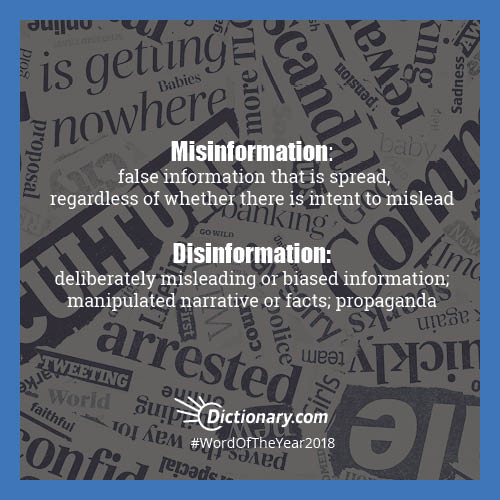 From Dictionary.com- The word of the year is "Misinformation." - and you can learn the difference here between "Misinformation" and "Disinformation." (Simply think Fox News for generating the latter because it's Intentional).
From Dictionary.com- The word of the year is "Misinformation." - and you can learn the difference here between "Misinformation" and "Disinformation." (Simply think Fox News for generating the latter because it's Intentional).2018 Word of the Year Is … Misinformation
The rampant spread of misinformation poses new challenges for navigating life in 2018. As a dictionary, we believe understanding the concept is vital to identifying misinformation in the wild, and ultimately curbing its impact.But what does misinformation mean? Dictionary.com defines it as “false information that is spread, regardless of whether there is intent to mislead.” The recent explosion of misinformation and the growing vocabulary we use to understand it have come up again and again in the work of our lexicographers.
Over the last couple of years, Dictionary.com has been defining words and updating terms related to the evolving understanding of misinformation including disinformation, echo chamber, confirmation bias, filter bubble, conspiracy theory, fake news, post-fact, post-truth, homophily, influencer, and gatekeeper.
Misinformation vs. Disinformation
The meaning of misinformation is often conflated with that of disinformation.
However, the two are not interchangeable. Disinformation means “deliberately misleading or biased information; manipulated narrative or facts; propaganda.”
So, the difference between misinformation and disinformation comes down to intent.
When people spread misinformation, they often believe the information they are sharing. In contrast, disinformation is crafted and disseminated with the intent to mislead others. Further confusing the issue is the fact that a piece of disinformation can ultimately become misinformation. It all depends on who’s sharing it and why. For example, if a politician strategically spreads information that they know to be false in the form of articles, photos, memes, etc., that’s disinformation. When an individual sees this disinformation, believes it, and then shares it, that’s misinformation.
